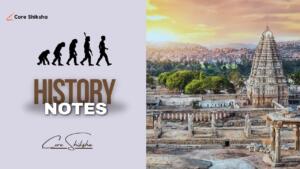History is a topic that requires strong presentation skills. To improve your writing style, clarity, and readability, practice answering questions on a regular basis. Work on structuring your responses, providing relevant examples, and incorporating historical nuances. Stay up to date with current events, particularly those related to history. Read newspapers, periodicals and online sources to stay informed about historical arguments, new interpretations of historical events and latest archaeological findings. Understanding historical research techniques and applicant’s knowledge with chronological events is highly valued in the UPSC’s history curriculum. It is also included in general studies paper 1 of IAS Exam.
UPSC History Notes
History is one of the most important subjects that the UPSC emphasizes in the UPSC Prelims and the UPSC Mains exams. It is essential to understand what happened in history to shape the current and future. The UPSC conducts civil service examinations every year to select candidates for various civil services of the Government of India. For these selected candidates, the study of Indian history is very important in understanding the character of history and the challenges faced by India as a nation.
The history of India is a very important subject for the UPSC Exam and it is categorized in following;
- Ancient Indian History
- Medieval Indian History
- Modern Indian History
History Syllabus for UPSC – Topic-Wise Notes for Prelims & Mains Exam
| Components of History | Period | Topics |
| Ancient History | Prehistoric Period | Paleolithic Age: Characteristics, tools, lifestyle |
| Mesolithic Age: Transition, tools, social structure | ||
| Neolithic Age: Agricultural revolution, settled life | ||
| Chalcolithic Age: Copper/bronze tools, early urbanization | ||
| Indus Valley Civilization | Location and extent | |
| Major cities (Harappa, Mohenjo-Daro) | ||
| Urban planning, drainage system | ||
| Economy, trade, agricultural practices | ||
| Social structure, religion, art and craft | ||
| Vedic Period | Rigvedic and Later Vedic societies | |
| Political structure, economy | ||
| Vedic literature, religion, social hierarchy | ||
| Mauryan Empire | Rise of Mauryan Empire | |
| Administration, economy, society | ||
| Contributions in art, literature, philosophy | ||
| Gupta Empire | Rise and golden age | |
| Administration, economy, society | ||
| Cultural achievements, science, philosophy | ||
| Medieval History | Early Medieval Period | Chola, Pallava, and Chalukya dynasties |
| Arab invasions and impact on Indian society | ||
| Delhi Sultanate: Administration, economy, society | ||
| Mughal EmpireRegional Kingdoms | Babur to Aurangzeb: Expansion, administration, cultural developments | |
| Impact on Indian society, art, architecture, literature | ||
| Vijayanagara, Maratha, and Rajput kingdoms | ||
| Socio-economic life, cultural achievements, conflicts | ||
| Modern History | British Colonial Rule | Arrival of Europeans, establishment of British rule |
| Economic policies, administrative changes, social reforms | ||
| Indian Freedom Struggle | Early movements (1857 revolt, Swadeshi movement) | |
| Role of leaders like Gandhi, Nehru, Bose, and others | ||
| Partition of India and Independence in 1947 | ||
| Post-Independence India | Constitution-making process, key features, amendments | |
| Economic policies (planned economy, liberalisation) | ||
| Foreign policy, challenges, and achievements |
Tips to Prepare History for UPSC Civil Services Exam
The history syllabus includes a wide variety of historic events and personalities, so it is important for the candidates to have a good knowledge of the most important history topics for the UPSC exam.
However, we have provided practical tips below to help you in preparing for the history section.
- Analyse the history syllabus and don’t just focus on the important history topics. The questions from the UPSC exam are unpredictable, so you need to be prepared for all types of questions.
- Use the NCERT books for UPSC to get a good theoretical foundation.
- Go through the UPSC previous year question papers to know the level of difficulty and the important sections.
- Make short notes so that you can revise the subject in a short time.
- Focus on more facts and figures and don’t read from many books and sources.
Conclusion
History notes are a must-have for UPSC aspirants. With proper preparation, well-structured outlines, and an analytical mindset, they can help you gain a deeper understanding of historical events. Not only can they help you remember facts, but they can also help you understand the context, make connections, and create cohesive stories. When it comes to UPSC, history notes are one of the most important resources you can have. They help you understand the vast and complex world of human civilization and provide you with the tools you need to succeed. With a well-written history note, you can learn how to master the knowledge of the past and develop critical thinking skills.

